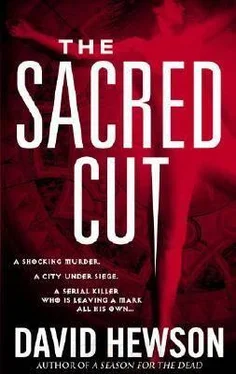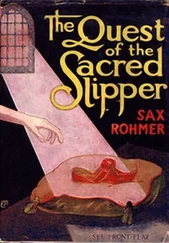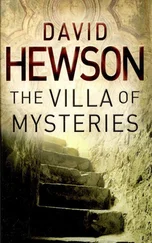“We need to know what happened in the Pantheon,” she insisted. “What she saw.”
“Now that ,” Costa answered, “is a place even Gianni can’t go just yet. The shutters come straight down. Give him some time. We’ve got that, you know. This man is on the run now. Maybe on the street himself. He knows we’re looking for him. He’s not leaving Rome in a hurry. There’s not a train going out of Termini. No buses. No planes. Not much traffic.”
She thought about the way the man had looked at her the previous night, the conscious decision he’d had to make. “He doesn’t want to leave Rome. He’s got unfinished business here.”
“Then we’ll work on finding out what it is,” Costa insisted.
“This is crazy. Why am I here? Why are you keeping a material witness in a private house? The only murder witness we’ve got?”
“Why not?” Costa asked. “Where else would she go? She doesn’t have a home. She doesn’t have parents, not here anyway. None of the charities want her because all she does is steal stuff in front of their eyes.”
“I don’t care!” Emily yelled, hearing her voice rise a couple of decibels. “This is all so wrong . You can’t run a criminal investigation like this.”
The pathologist rolled her eyes up at the ceiling and said nothing.
“So what do you think we should do?” Costa asked.
“Talk to her some more. Now . Get Leapman down here.”
“She’d like Agent Leapman,” Teresa said quietly. “She’d just love a man like that. I bet she wouldn’t stop talking.” She looked Emily directly in the face, daring her to argue. “Well?”
“OK,” Emily agreed. “Maybe that’s not such a great idea.”
“So what do you think we should do?” Costa repeated.
The girl put her head round the door of the kitchen. Emily could see the doubt in her face. The kid had heard her yelling, could sense the tension in the room.
Emily Deacon made herself smile.
“Let’s eat,” she said under her breath, then added more loudly. “Laila. You made us breakfast. That’s nice.”
“Ready!” The girl gestured into the kitchen.
They sat around an ancient wooden table. Peroni and Laila handed out dinner plates of food: potatoes, onions and peppers, with a couple of fried eggs perched on top of each, everything swimming in olive oil, with bread on the side. Emily Deacon looked at hers and wondered when she’d ever eaten anything like this before for breakfast, lunch or dinner.
“Good country food,” Peroni said, stabbing a finger at the plate. “In a normal house”-he cast a deprecatory glance at his partner-“there’d have been some ham or sausage or something.”
“It’s lovely as it is.” Emily sighed, watching Teresa Lupo retrieve an old bottle of ketchup from a cupboard, stare at the use-by date, shrug her shoulders and set the container on the table. The girl grabbed it straightaway, deposited a pool on her food and started to eat manically, as if she’d been starving for half her life. Which, Emily reflected, just might be the case.
Then Laila looked up at them, amazed they weren’t touching their food.
“Eat!” she ordered. “ Eat !”
Emily Deacon tried a corner of crisp, almost burnt egg, and, suddenly, out of nowhere, found herself laughing, a self-conscious, half-hysterical laugh, one that stemmed in part, she decided, from her amazement at being among these odd strangers, being touched by the intimate ordinariness of the scene.
Somewhere out there a man was carving magical shapes on of the backs of dead people. He was waiting in the frozen city. And he had a name. Kaspar. It came to her now. A distant, returning memory from childhood, ten, twelve years ago, maybe more. She’d been in the study of their old apartment on the Aventine hill, stopping her practice on the upright piano for a moment, overhearing a remark from one of her father’s rare discussions of his work with her mother.
Bill Kaspar. What a guy .
“What a guy…” she murmured.
Peroni was peering at her. “Who, me?”
She smiled at the crude, makeshift feast on the table, and Laila, who’d just about cleared her plate and was eyeing Peroni, probably wondering if, like Oliver Twist, she could really ask for more.
“Sure, Gianni,” Emily agreed. “You.”
IT WAS JUST A CAR. Some lunatic with an ancient Renault, probably stolen, who didn’t give a shit what happened once he’d had his fun. Falcone quickly picked up the story from the two uniformed men on the scene. The moron had torched the vehicle outside the church at the top of the steps then, watched by a couple of goggle-eyed street hawkers, pushed it over the edge. The vehicle had rolled and tumbled down the hill, settling in front of the fountain in the Piazza di Spagna, where the fuel tank had exploded with the soft roar Falcone had heard from down the road. Now a puzzled-looking fire crew were hosing down the damn thing in front of a small crowd of puzzled onlookers.
It was an odd and disturbing scene in a part of the city that never quite worked for Leo Falcone. The mix of tourists and McDonald’s rubbing shoulders in the shadow of the house where Keats died puzzled him at the best of times.
Falcone strolled back down the Via del Babuino and ordered the uniformed men to return to the Questura, then he called intelligence to check the name on the passport. After they had run a swift search he set off on the drive out to Costa’s house, taking the time alone to think about that morning’s meeting with Joel Leapman, Bruno Moretti and Filippo Viale, the grey man from SISDE, and the way they all just sat there, silent, as if this were some kind of game.
The streets were treacherous: half snow, half slush. Even in the abnormally light traffic he had to be on his guard every moment. The average Roman had never driven on snow. What passed as the normal rules of the road in Rome were gone. Cars were careering around crazily, from right to left and back again. Drivers were arguing with each other over minor collisions. The city was, briefly, beyond control, beyond order. He thought about the old Renault tumbling down the Spanish Steps, bursting into flames at the foot of the staircase, and how amazing it was no one had got hurt. Rome, like any big city, had its share of vandalism. Still, there were always places that were somehow exempt, almost sacrosanct. People didn’t mess with sights like that. It would be like spray-painting graffiti on St. Peter’s.
Until now .
Falcone turned the car into the narrow lane that was the Via Appia Antica and couldn’t stop himself from laughing. The city streets were a mess. The authorities just didn’t have the right equipment to clear up after the constant blizzards. Here, at the municipal boundary, the Via Appia became clear and safe, still showing cobblestones that were, in places, a good two thousand years old.
“Farmers,” Falcone said to himself. The tractors had been out, unbidden, without payment in all probability, ploughing aside the drifts. This was where the city ended and a different kind of Italy started. He made a note to remind himself of that the next time he wondered why Nic Costa lived where he did.
The drive to Costa’s farmhouse was different, though: deep in snow so thick that Falcone kept his foot lightly on the pedal all the way, and was grateful the car didn’t grind to a halt. He made one call back to the Questura, then stood on the doorstep, stamping his shoes to get rid of the packed ice, sniffing the air, trying to work out if the smell of the countryside, fresh and wholesome, really suited him.
Costa looked him up and down when he opened the door. “Problems?”
“A few,” Falcone replied. “Is she still here?”
Читать дальше










